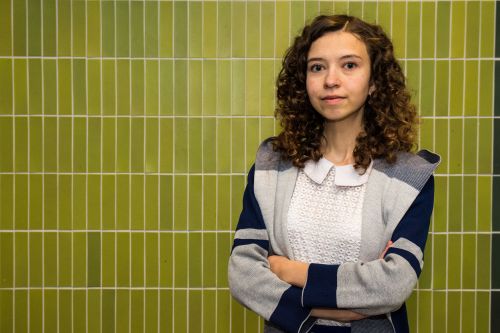
Polina Zhilkina studies eight different languages. But science, she says, is the most universal tongue of all. No matter where you are, the laws of physics, chemistry, or thermodynamics are always the same and can be universally understood.
From a young age, Polina was eager to learn new dialects and experience different cultures. She was accepted into the United World College, a study abroad program, and moved from a small town in Russia to the Netherlands for high school. The program brought together students from more than 150 countries, many of whom spoke different languages. Polina soon realized that the best way to communicate was through science.
“Science is a universal language that connects us all because its principles apply globally,” she says. “You can’t learn all of the languages of the world. But what is universal among all of the world’s communities is the application and importance of science.”
Polina’s desire to speak this universal language of discovery and theory led her to Princeton. At a liberal arts university, she was able to pursue passions for language and theatre while also building a strong foundation in science. Today, the senior in Mechanical & Aerospace Engineering specializes in fluid dynamics and is exploring ways to apply flow principles to create sustainable energy solutions.
Together, with her lab partner, Seth Freeman, they found a way to combine these interests into a senior research project. While most undergraduate theses are a continuation of an existing lab project, they decided to create their own. Their work was inspired by Professor Howard Stone’s graduate course on viscous flow dynamics and boundary layers.
The research project is centered around magnetohydrodynamics, the study of behaviors in electrically conducting fluids. Polina and Seth are attempting to extract energy from ocean waves based on a process known as ferrofluid sloshing, which generates an electric current using a magnet and a fixed coil. The team even created a novel prototype that produces this clean energy.
“It is like the fluid has magnetic properties,” she explains. “If you wrap a coil around a bottle with liquid in it, you can essentially make a liquid solenoid. When it sloshes around, you create a magnetic flux that can produce electricity.”
While researchers have experimentally studied the concept of ferrofluid sloshing mechanism, the optimization and adaptation of these results have not been applied to the ocean before. The waves create an almost self-sustaining environment for ferrofluid sloshing. “The ocean has a tremendous amount of potential,” describes Polina. “If we can extract even a small fraction of energy from the waves, we could power entire cities.”
The lab mates used flow theory to develop a theoretical and computational framework for coupling electromagnetism and fluid dynamics. Then, they applied Basilisk software to simulate the ferrofluid sloshing dynamics. Finally, the pair designed experimental procedures to optimize the geometric parameters of the device and maximize the energy it created.
“The existing technology that takes energy from the surface of the ocean is very high maintenance. It needs frequent repairs because the equipment is subjected to the harsh environment of the sea,” Polina explains. “Since our system is small it does not require as much maintenance as other ferrofluid devices out there that utilize turbines and heavy machine parts.”
Professor Howard Stone, who serves as Polina’s advisor, has enjoyed working with the teammates. “Polina has been organized and disciplined, both in terms of problem identification (energy extraction from sloshing of a magnetic fluid in a magnetic field) and with respect to designing a model computational problem to learn more about the dynamics. She and Seth are also designing a model laboratory-scale experiment,” he says. “It has been impressive to see the week-by-week progress of ideas and understanding, and I look forward to her next steps.”
Polina has been involved in numerous computational research projects at Princeton. In Dr. Košmrlj’s lab, she adapted simulations using Python, FEniCS, and Gmsh to visualize the effect of symmetry breaking on phononic band diagrams for 2D crystal symmetry groups. She also received the Princeton Fred Fox Fund research award to study the application of first-order numerical methods in a shock tube problem.
Her affinity for languages also translates to the stage. Polina has performed in numerous plays at Princeton in both Italian and French. During her study abroad program in the Netherlands, she wrote, translated, and directed a play based on the memoirs of children affected by the Second World War. The profits were donated to the American Red Cross.
Polina is also involved in numerous leadership activities. She is Vice President of the Princeton Society for Engineering Ethics, which addresses ethical and moral dilemmas in STEM research and the workplace. In addition, she serves as an engineering advisor for first-year students and a tutor in mathematics at the McGraw Center for Teaching and Learning.
After graduation, she plans to continue learning and speaking the universal language of science. “There are a lot of similarities between studying science and language. The skills and abilities you acquire in both areas allow you to communicate anywhere,” she says. “I look forward to pursuing scientific projects that help bring universal messages to the world.”
-- Carolyn Sayre